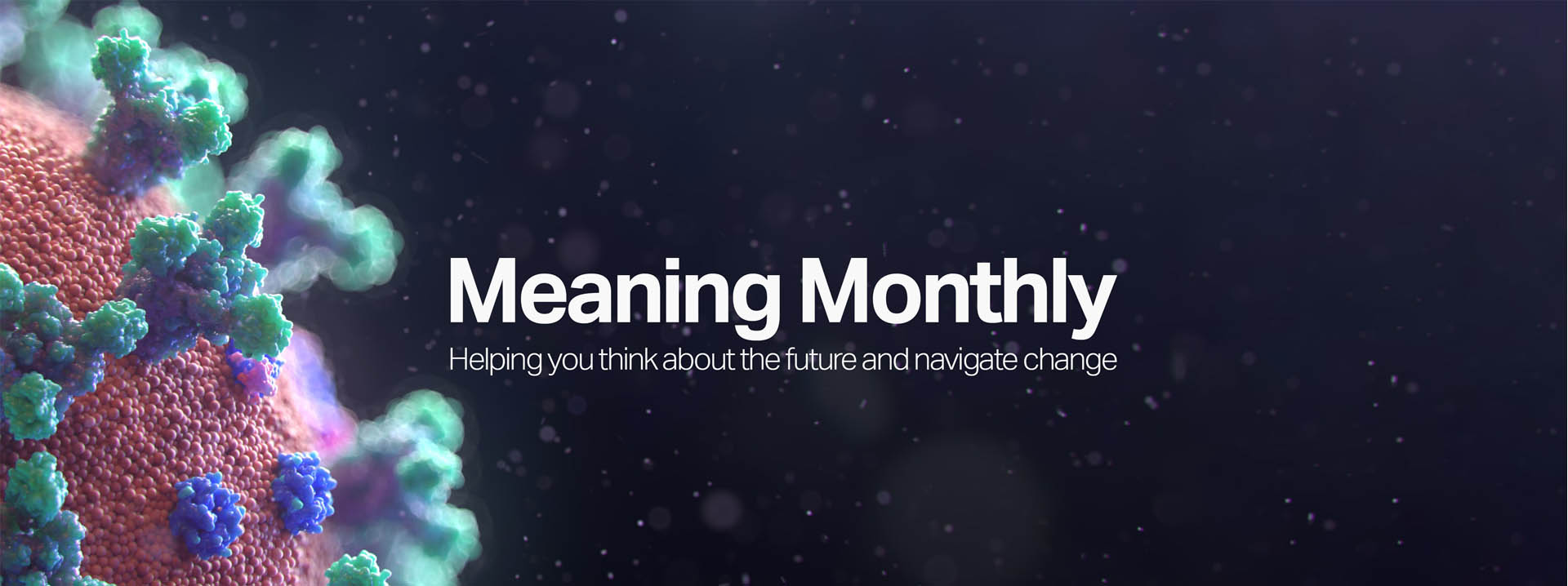
July 2020
Meaning Monthly is our new monthly newsletter comprised of the top insights from our design and strategic insight teams. Focused around home and health, it will feature trends, observations, and consumer behaviours; allowing you to better understand the future of the industries.
This month, we have focused on Covid-19. We have all had to deal with rapid and unexpected change. Here at Recipe, we have been working hard to gather insights to help you to better understand the impact of the virus, what it will mean going forward, and how to navigate this ‘new normal’ as individuals and organisations seek to regain control and people begin to live by reassessed meanings and values.


Fighting an invisible virus has heightened our awareness of hygiene. As we learn to live through the pandemic, cleaning and sterilisation practices have taken on renewed significance, a trend reflected in sales figures for domestic cleaning and personal care products
In public, consumers are reluctant to engage with any spaces that could increase their risk of infection. The additional rules and requirements although necessary, have for some increased feelings of fear and unease.
Contact with surfaces and other people is being avoided, even demonised. As a result, hands-free, minimal-contact, voice-activated products and interactions are in-demand and on the rise. Environments are being assessed and retrofitted with empathetic, reassuring design interventions that prevent or reduce disease transmission.
As we slowly step back into public life, how will our environments help us stay healthy? How can designed elements provide functional solutions that alleviate residual anxiety or fear?


In recent years, sustainability has risen to the top of consumer agendas, a shift that has brought about extensive changes across industries.
However, since the Covid-19 outbreak, the scales have tipped back, with focus centring on hygiene and cleanliness instead. This has meant the unprecedented consumption of disposable items such as gloves and masks, and a reduction in sustainable habits such as using reusable cups and containers, taking public transport, and buying second-hand goods.
While this is an immediate and necessary response to contain the outbreak, it is clear that hygiene will remain a priority for the foreseeable future.
As consumers start to reconnect with their eco-conscious values, what new habits and behaviours will we see forming as people find ways to balance the needs and desires for sustainability and infection control?


As a remedy to social distancing, our lives and relationships quickly shifted into digital spaces. Social platforms raced to develop new tools to help facilitate this new way of interacting, such as Netflix Parties and Facebook Rooms.
VR companies want to go one step further, by not only helping us stay connected, but simulating our real-world lives. So far, this technology is being tested across multiple scenarios, from live concerts and spectator sports to retail experiences. Could VR eliminate the need for us to be physically present altogether?
Now, the challenge for VR is to find ways to simulate other human experiences, such as body language, emotion and physical touch. The digital acceleration of Covid-19 has made it somewhat inevitable that these tools will be developed imminently. But can digital technologies every truly replace the physical connection and presence of human contact?
As VR experiences continue to evolve, how will they reshape our lives, and change the way we interact with the world around us? What differing roles will virtual and real-life interactions continue to fill and what will they each mean to us?


Across the world, countries responses to the pandemic varied greatly, often in line with localised behaviours and cultural norms.
For China, this meant mass surveillance techniques to track and contain the outbreak. This included facial recognition, mandated health checks, and location monitoring. It is suggested that these measures helped the number of cases in China fall faster, and now track the potential second wave.
Such successes led to similar technologies and techniques being introduced elsewhere.
In the UK however, this level of surveillance is new territory, with similar introductions for counter terrorism measures both seen as an infringement of personal privacy and a possibility for protection. In the pandemic the need for immediacy means that systems and policy aren’t being formed fast enough to regulate and resolve these issues. These technologies are challenging our norms and changing the relationships and trust that we have with the infrastructures that surround us.
As these methods prove their worth however, it is likely that they will continue to be implemented. As systems and policies are developed at speed, how can we ensure alignment with localised values and behaviours so that they can more comfortably become part of everyday life?


Traditionally private and competitive, pharmaceutical companies are showing signs of gentle shift toward more open sourced medical development.
The pandemic has escalated the need to work closer and more openly with traditional competitors. In the race to produce a vaccine countries, corporations and medical communities have come together to share insights on the virus, as well as testing results and developmental successes.
This collaborative effort has highlighted the importance of making pharmaceutical research accessible. Removing the repetition of work, improving quality and safety, and helping new medicines get to market faster.
Now that we are seeing the potential of open sourced medicine, how will this change the pharmaceuticals landscape going forward?
Meaning Centred Design Assessment
Meaning Centred Design helps your business understand how people think about, perceive and understand what you stand for and what you have to offer.
MCD Insights can be mapped and translated into new propositions with the potential to make your brand more distinctive, more engaging and ultimately more valuable.
This assessment is an interactive online tool that will help you quickly assess your current situation. It takes less than 5 minutes to compl